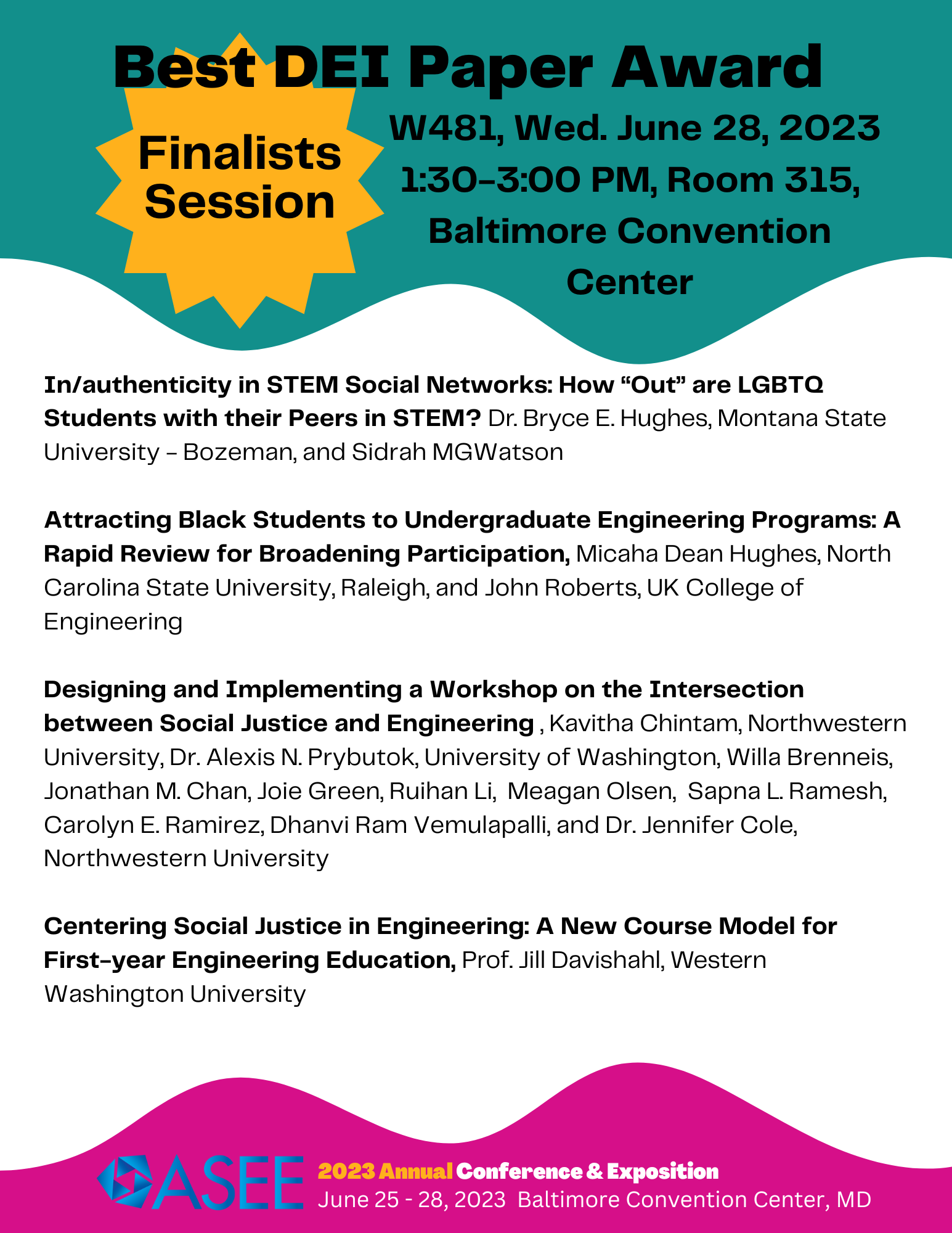Don’t Miss These DEI Best Paper Finalists…and Winner!
The ASEE Best Diversity, Equity, and Inclusion Paper Award strives to enhance the visibility and sustainment of actions supporting diversity and engineering and engineering technology. Every year, papers submitted to the ASEE Annual Conference and ASEE Section/Zone Conferences may be nominated for the award. The Awards Committee of the ASEE Commission on Diversity, Equity, and Inclusion gathers the nominations and assembles a volunteer review panel. The papers are reviewed against the ASEE Best DEI Paper rubric to assess their novelty of approaches, extent of inclusivity, demonstrated impact, and communication effectiveness.
The top papers are nominated for presentation at a special session at the ASEE Annual Conference, after which the selection committee panel chooses the winner based on the manuscript and audience impact of the presentation. Finally, join us at the 2024 annual conference (likely Tuesday Plenary), where the winning paper will be presented alongside the Best PIC paper and the Best Zone Paper.
We highly recommend reading this year’s finalists, with topics ranging from practitioner experiences to research on issues that broadly affect engineering education. All papers and presentations were highly meritorious, providing stellar examples of ways engineering educators can address diversity, equity, and inclusion as they support student learning and enhance their own research.
📄 B. Hughes and S. MG Watson examined the impact of peers and peer networks on how engineering students are able to belong and be themselves in their engineering community, particularly students who are historically excluded or not able to present themselves fully as they practice engineering. Their focus on LGBTQ students is important, and the knowledge can support all students with hidden differences. https://peer.asee.org/43618
📄 M. Dean Hughes and J. Roberts looked at the processes and models used by admissions recruiters that may directly and indirectly exclude students we hope to become engineers. While we try to pass on the message that students will belong and “fit” into our institutions, especially Black students, there is a mismatch between outreach information that may initiate identity formation and how we recruit and admit students, which may exclude the very students we hope to include in our programs. This has implications for the messaging engineering faculty and administrators use when interacting with our admissions colleagues and prospective students. https://peer.asee.org/42342
📄 J. Davishahl told a compelling story of the impact one faculty member can have on the experiences of many students. With empathy, equity, and awareness of failure incorporated in a first-year class on engineering design, students experienced a new way of seeing their potential careers; after requiring this class, the school’s polymer engineering major reached gender parity. Her approach to consensus-building produced buy-in and acceptance from her faculty colleagues, opening the door to future integration of social justice topics throughout the curriculum. https://peer.asee.org/43150
📄 K. Chintam, A. Prybutok, et al. highlighted the value of new ways of thinking about graduate education and faculty professional development. A student-organized workshop provided a structured framework for engineering graduate students and faculty to explore social justice in engineering research areas and extend these tools into future research and their careers. They openly disseminated their modules for replication and effectively positioned the workshop to self-sustain after the original organizers graduated from the institution. Meeting their community goal of lasting change in response to events of 2020, the workshop provides a way for engineers to discuss how to include values of social justice in technical research work. https://peer.asee.org/42969
After a great deal of deliberation, the selection committee for the Best DEI Paper for the 2023 ASEE Conference determined that the paper nominated by the Chemical Engineering division, “Designing and Implementing a Workshop on the Intersection between Social Justice and Engineering,” by K. Chintam, A. Prybutok, and colleagues at Northwestern University, inched above the rest as a clear, adaptable model for action and potential impact by ASEE colleagues.
The committee congratulates all of the finalists and honors their important work.
Karin Jensen and Katey Shirey are Awards Committee co-chairs for the ASEE Commission on Diversity, Equity, and Inclusion, and offer special thanks to the Awards Committee Selection Panel, Rebecca A. Bates, Adrienne Minerick, and Susan E. Walden.

